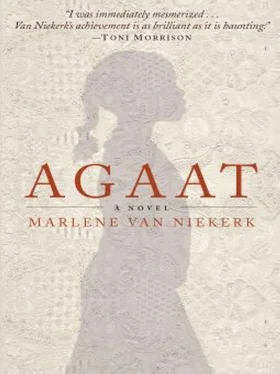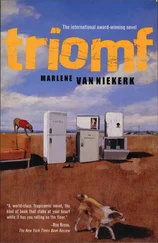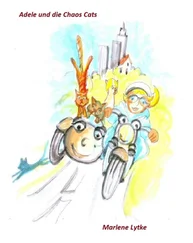Jak was volatile. You were scared on the Saturday afternoon that he would unleash something when he got home, worked up after his sports meeting. That was why you had summoned your mother.
You were in the nursery putting up a gauze curtain. You’d opened the window to get rid of the smell of paint. Ma was in the kitchen making coffee after her afternoon nap. The kitchen door was open. Across the yard you could hear the rattling of cups. The bakkie drove in and the dogs barked. Jak was back from the rugby match, back from the bar where he’d socialised afterwards, you could tell from the way he drove into the yard, the slam of the bakkie door. He would come in by the back way. A movement drew your attention. The door of the outside room was still open from Ma’s inspection earlier in the afternoon. Was it your imagination, or had something moved behind the curtain? The cups stopped rattling.
Then Jak came round the corner and swore and looked under his soles. He’d stepped in dogshit, and was instantly furious. His new calf-leather boots. Salomo the ridgeback and Sofie the half-bred Scottish terrier were grovelling towards him on their sides. They knew better by this time than to jump up and to lick. Hand on the hip he stood and watched them. Under Sofie the cement grew dark with pee. Salomo’s ears were back and his lip was pulled up. His whole body was quivering.
Jak grinned, coaxed the dogs nearer. Behind the screen door you could see the white blotch of your mother’s face. You stood back behind the gauze curtain.
You could have stopped him, you could have opened the window, you could have said Jak, the coffee’s ready in the kitchen, how was the rugby? But you said nothing. You knew that your mother would not betray her presence either. Witness, was what you two wanted to do, witness, and be each other’s witnesses. Again a stirring in the outside room. How many pairs of eyes were there that afternoon?
Jak had his back to you, right in front of the kitchen door. You could hear everything.
You think you can growl at me, you think you can bark me off my own backyard, you think you can crap all over the place here!
Then three kicks. One at Sofie before she could get away, and two into Salomo’s body where he was lying on the ground.
So get away! he hissed at Salomo through his teeth, sag-balls! Should wear underpants, you, he snarled. Powder-prick! No-good, you’ll let them rob us blind here!
The dog struggled up, limped away glancing back nervously. Jak scraped his soles clean with a twig, washed his hands at the tap in the backyard and dried them on his pants, looked at his watch.
Then you pushed open the window of the nursery.
Jak, you said, the coffee is ready in the kitchen, Ma made it.
He looked at you, then darted a glance at the screen door. He walked away quickly, in the direction of the sheds.
You sat down on the chair in the nursery and waited. You unfolded the toy lampshade that you still had to put up. A yellow face with a wide laughing mouth. Open and shut, open and shut you folded it, the sun a fan in your hand.
Your mother came in with a tray and three cups. She put the tray on the washstand, closed the open window, drew the curtains.
She said nothing, waited for you to speak.
Jak is frustrated, you said.
You kept your voice light. It felt as if it was you who’d kicked the dogs. You got up and started fiddling with the baby things on the washstand.
He’s not really a farmer, Ma, you know it yourself.
She said nothing. She waited. You stole a glance at her. She already knew every word that you would say.
He feels worthless, then he takes it out on the dogs.
She made a sound.
He feels I’ve got him under my thumb. And now I’m pregnant, at last after all the years, the centre of attention. I suppose he feels neglected.
Your voice dried up. You were starting to get angry. Old bat preying on me, you thought, first he wasn’t good enough to farm on your land, then he’s the golden boy for twelve years while he’s mistreating me, and you shrug it off as if it’s nothing, and now that I’m pregnant, he’s suddenly a villain if he kicks a few dogs. Keep your nose out of my affairs, you thought. Your cheeks were burning.
You opened the curtains again. The door of the outside room was now wide open. Somewhere in the house you heard a door slam. Something fell onto the floor in the back room. You felt dirty. Your house felt dirty.
Your mother’s voice was like a dipping-rod in your neck, down you had to go, down into the white milky poison.
Milla, look at me, she said, sit down on that chair so that I can talk to you. I’m old, I know more, and I understand more than you think. My life is almost over, I’m free to talk now, I must talk, so that you can’t say one day your mother kept up a front to the day of her death.
Ma, just let it be! You waved your hands around your head.
You will listen, Kamilla. And the walls will listen.
The floorboards in the passage creaked. You signalled with your finger in front of your lips.
But she only talked louder.
Too much understanding of the evil-doer and too little indignation with the evil, she said, that’s how women make a virtue of their own suffering and how men get away with murder. You needn’t keep spinning me pretty tales. Nor he. And don’t try and absolve yourself of all blame in this. Jak de Wet kicks his dogs for two reasons: Because they can’t flatter him in full sentences and because they can’t tell anybody what a two-faced churl he is.
You protested, she held her hands up in the air to stop you.
Let me finish, she said.
Do you want to carry on being his dog? You know that you’re now the mother of his child. You know that you can keep him at bay with the same arts with which you caught him. Don’t think I didn’t notice how you worked him. But you can do more. You’re now a fully fledged woman. People will listen to you now. You can tell people what’s happening, your woman friends, your mother. We women may be the weaker sex, but we’re actually in charge, you know that as well as I. We just work in different ways. We needn’t be scared. We’ve got hold of them where it hurts most.
She stretched out her hand. The elbow was stiff. It was only half bent, slightly extended in front of her. You wanted to look away, but you couldn’t. The hand cupped itself around something imaginary, from below, caressed it, the fingers writhed, grabbed, twisted. At last she dropped her hand. There it lay, in her lap, large, weathered, with gnarled joints.
A story, she said, is an easy thing to spread.
You couldn’t look away from the hand. You thought, let go of me, I’m infected already, you can’t make me any sicker than I am. You don’t know why you thought that. All the time in that little room you felt undermined and underpinned at the same time. Fed and fed-upon at the same time. You rolled your shoulders and blinked your eyes to get rid of the feeling, you tried to see her as she was, tried to hear what she was saying, because for the first time in a very long while she was actually trying to talk to you.
If the story hasn’t spread already, she continued. There’s nothing, is there, like a good housemaid to send the truth into the world. You need only speak the word. They’re women. They know about things. They live for their mistress, what else have they got to live for? Their husbands? You need only encourage one of those a bit, and there it runs, a veld fire. Kitchen, co-op, consistory. You have quite a few here, don’t you, that you can recruit. The little young one strikes me as particularly suited to the purpose. A rumour in these regions, I’m telling you today, is the best way of keeping a man in his place. If the people know, they’ll look at him askance, pass him by, push him out of places where it matters to be seen, to belong to. Then he’ll come and cry on your shoulder. He’ll come and ask you to help him. Then you can set your terms. He’ll do everything and anything to get back in favour. He’ll stop, I know the kind, then he’ll stop.
Читать дальше












